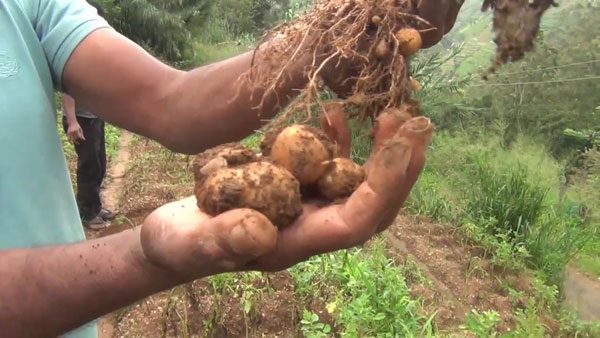News
In potato paradise, farmers ditch organic fertiliser after poor harvest
In Sri Lanka’s potato paradise Welimada, farmers say they are going through a financial hell after a drastic harvest shortfall which they attribute to the use of organic fertiliser instead of chemical fertiliser.
While the farmers are suffering losses, consumers are hit by a shortage of potatoes in the market.
Farmer T.M. Muthubanda bought 50kg of seed potatoes for Maha Kanna cultivation. “I grew seed potato to sell seeds for the Yala Kannaya, I could not get the chemical fertiliser after the Government imposed the ban. The harvest was poor. The ban also caused a drop in demand for seed potatoes as many farmers were not willing to cultivate due to lack of fertiliser.

While the farmers ssuffer osses, consumers are hit by a shortage of potatoes in the market.
“Then I grew about 400kg of seed potatoes in my own field using organic fertiliser. I bought 20 bags of organic fertiliser at Rs 550 each. I normally use about 250kg of chemical fertiliser for 400kg of seeds. The crops were not growing to my expectations. I even used liquid chemical fertiliser to give nutrients to the crops to no avail. But the farmer who was cultivating in the field next to mine used chemical fertliser and yielded a good harvest.”
Mr. Muthubanda said that while the yam of his field was small in size, his neighbour had the usual big potatoes. He said he had decided not to use organic fertiliser in the future.
Welimada Uwaparangama Govi Jana Ekamuthuwa president W.M.Gunawardena said he knew that organic fertiliser was of little use for potato cultivation and as he feared, many farmers experienced a 35-40% drop in the harvest.
The farmer leader said the prices of potatoes and vegetables would rise further because of the fertiliser problem. He said agriculture field officers knew well that the use of organic fertiliser would not result in a bountiful harvest but they were scared to speak out and be labelled as agents of agro-chemical companies.
“We should have started cultivation this month, but farmers have decided not to grow anything. Seed growing has come down drastically. Normally we keep some seed potatoes for the next season. So if we don’t cultivate seeds in the Maha season, we won’t have any seeds for the Yala season,” he said.
An Agriculture officer said that using only organic fertiliser would not lead to a good harvest. “There is not enough nutrients in organic fertiliser. We see a marked difference between the crops grown with these two kinds of fertilisers. To give more nutrients, farmers are told to spray liquid fertiliser on leaves, but only 5 percent of it is absorbed. The rest is wasted.”
He said that according to Agricultural Department instructions, 26kg of chemical fertiliser should be used for 50kg of seed potatoes but there is no study done to estimate the amount of organic fertiliser for the same amount of seed potatoes. “There is no mechanism to test the contents of organic fertiliser,” he said.
A senior Badulla District Agriculture official who did not want to be named said that while the population grew, resources were becoming more and more scarce. Therefore, the challenge is to grow short-term crops, produce seeds and make fertiliser that give bigger harvest.
“Plants require nutrients such as nitrogen, phosphorous and potassium. The required quantity cannot be given through organic fertiliser. In our labs, we test the soil and recommend the amount of fertiliser it requires. But to come to power, politicians promised chemical fertiliser at low prices or free of charge. As a result, farmers used chemical fertiliser liberally. While they got a good harvest, they harmed the soil. Both farmers and the government should be held responsible for this sad state of affairs,” the senior official said.
He said the damaged soil should be made fertile again with the application of organic fertiliser, but it should be done gradually. “If we do it hurriedly, there will be problems in the long run.”
The best way to say that you found the home of your dreams is by finding it on Hitad.lk. We have listings for apartments for sale or rent in Sri Lanka, no matter what locale you're looking for! Whether you live in Colombo, Galle, Kandy, Matara, Jaffna and more - we've got them all!

